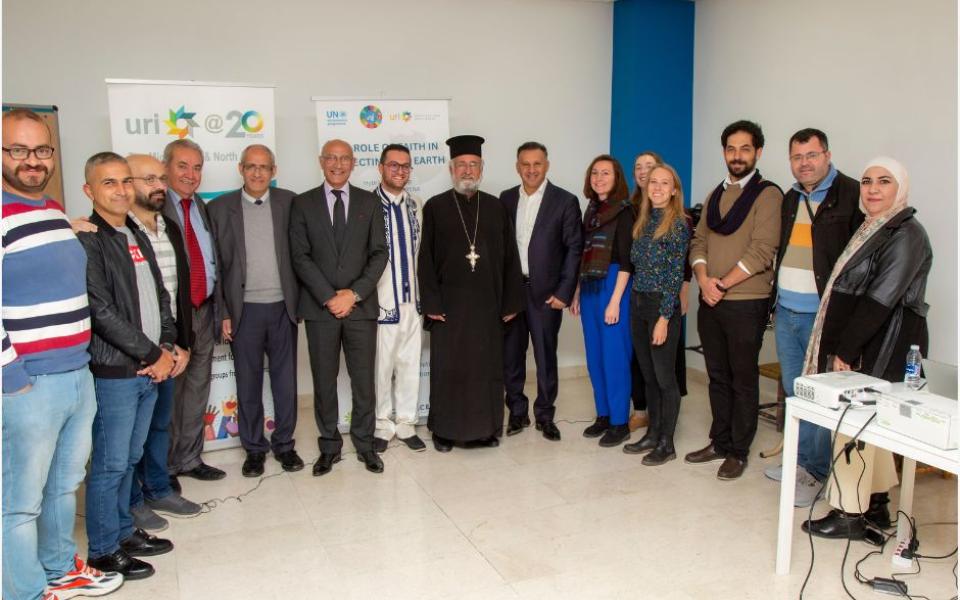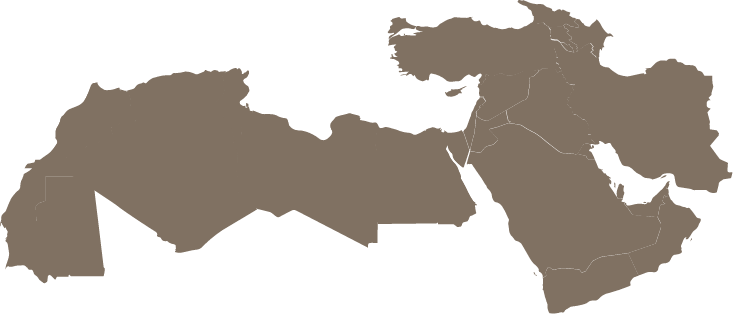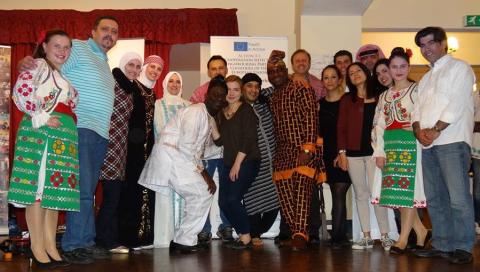
Following the launch of the Faith for Earth National Coordination Hubs by UNEP Faith for Earth initiative in partnership with the United Religions Initiative (URI) in 2021. URI- MENA Office in Jordan organized a full-day workshop on the ''Role of Faith in Protecting the Earth''. The workshop shed light on the important role of faith-based organizations and religious leaders in mobilizing people to respond to the climate crisis.
The event, which was held in Amman on 17 December 2022, was attended by 45 people from 5 countries representing several community-based organizations, academia (students and faculty), religious leaders, subject matter experts, and young people.
The opening
Dr. Iyad Abumoghli, the Founder and the Director of the UNEP Faith for Earth Initiative introduced the Faith for Earth initiative. He stressed the importance of mobilizing the vast interfaith network of grassroots faith leaders, faith-based organizations, and community members in different parts of the world to respond to urgent, climate-related concerns at the local, national, and regional levels.
Dr. Amer Al-Hafi, Professor of Comparative Religions at Al al-Bayt University and the academic advisor to the Royal Institute for Inter-Faith Studies, spoke about the Linkage between religions and the environment. He explained how all religions are somehow connected to the earth. He also addressed the negligence of nature's dignity. We tend to focus on acknowledging and protecting human dignity, while all religions ask us to preserve life in all its forms. So, we need to acknowledge that we are all not only part of the human family but also part of the animal species and the family of living beings.
Panel Discussions
In an open-style panel discussion, the following distinguished panelists shared different religious perspectives on protecting our environment and answered audience questions.
- Ms. Tahani Ruhi Helmy, a journalist, social media consultant, Interfaith Activist, and the Founder of Naya (a URI Cooperation Circle based in Jordan), talked about how the unity of purpose will resolve environmental challenges from the Baha'i perspective. Also, her colleague, Sameeh Qumi, highlighted the teaching of Bahá'u'lláh to develop a sense of world citizenship and a commitment to stewardship of the earth.
- Amb. Dr. Father Jeries Smairat, Priest of the Greek Orthodox Church and an Ambassador to the International Federation of World Peace Organizations, indicated that environmental protection is an integral part of Christianity. God has clearly placed humans in a position of responsibility over creation. (1) Genesis 2:15 says “The Lord God took the man and put him in the Garden of Eden to work it and take care of it.”
- Sheikh Haythem Limam, Content Manager, Radio Zitouna FM (For Holy Quran) and an affiliate of KAICIID Dialogue Centre, spoke about how Islam teaches us to be moderate in all aspects of life stressing that moderation is equivalent to balance and justice. It is one of the defining characteristics of good character in Islam.
- A recorded video of Rabbi Yonatan Neril, the Founder and Executive Director of The Interfaith Center for Sustainable Development in Jerusalem. He highlighted that the ecological crisis is a spiritual crisis. It is about human beings and how we live as spiritual beings in a physical reality. The operating system of billions of people is consumer-driven. The only force in the world that changes this operating system of consumerism is religion and spirituality. The root issues we need to tackle are greed, short-term thinking, egoism, and seeking pleasure in the physical.
The talks of all panelists were recorded. They will be translated to English and shared on URI's websites and different social media platforms.
Audience contributions
Young members of Desert Bloom, a URI Cooperation Circle, shared the experience they gained throughout their participation in the “Psychological and Eco-social Aspects of Climate Change” Youth Exchange in Spain in Oct. 2022. They explained how our lifestyle choices matter, addressing the daily habits that accelerate climate change. They emphasize how to make our lives more environmentally friendly by greening our lives toward a “Zero Waste” lifestyle” adopting the 5 principles of Zero Waste (Refuse, Reduce, Reuse, Recycle, Rot). Additionally, they shared some ecological farming and sustainability practices they saw during their visit to an ecological farm in Cantabria- Spain such as bio building, Rainwater harvesting, storage heating stoves, and recycling the waste oil into fuel.
Ecopeace interactive workshop:
Ms. Nawar (Sabe Eleish) and Ibrahim Al-Kilani, Environmental activists from Ecopeace, highlighted the impact of the climate crisis on nurturing the conflict and instability in the region, given the fact that the Middle East is the most water-scarce region on the planet. They stressed the idea of raising awareness of the challenges through education. Cooperation in the Middle East not only can establish climate security but also paved the road to sustainable peace. Nawwar presented the Jordan valley as an example of a nature site that is sacred in many religions and has the potential to transit from competition to cooperation.
We are grateful to Ecopeace, Desert Bloom, and the Interfaith Center for Sustainable Development for their contribution to the event's success.

